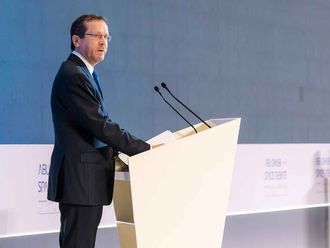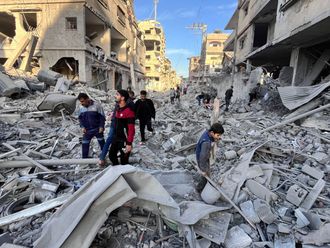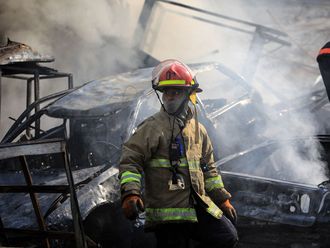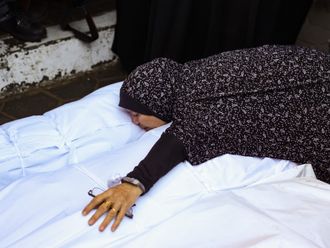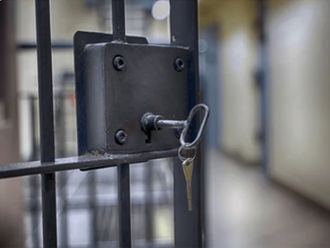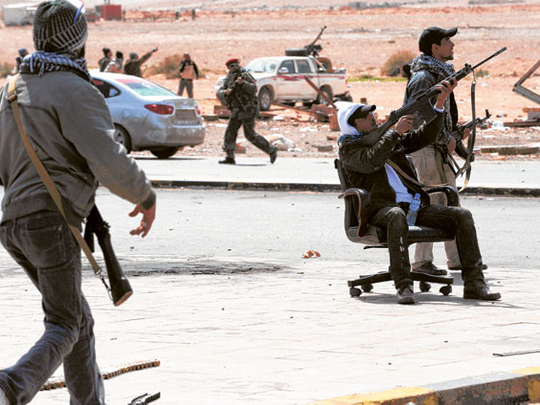
Benghazi: Twenty two year old Abdullah enters the room looking scared and insecure as officials from eastern Libya's interim government watch him.
He wears a blue sweater and black pants, hesitating to talk. Abdullah is one of 23 Africans detained in a Benghazi facility controlled by the interim government's public prosecution. He went out to buy food from the market 13 days ago when youths nabbed him and handed him over to the new authorities.
Abdullah says he has neither been questioned or been allowed to speak to his family back home in Niger. He worked as a cleaner in Libya. "My family was promised a fixed sum delivered directly to them every month for my cleaning services in Libya," he said.
The authorities are unsure of what to do with detained Africans. One of the attorney general's assistants insists that the detainees are being held for their own safety.
"Some were brought in injured. Because they are black, people assume that they are mercenaries roaming the streets and attack them," she said, asking not to be named.
Blacks have faced difficulties since word started spreading through eastern Libya that those attacking rebels were African mercenaries hired by the Gaddafi regime.
A number of scuffles have broken out in streets between black Libyans and what are referred to as "Arab Libyans". Many black Libyans are now seen wearing the monarchy flag that has been adopted by the rebels as arm bands or as stickers on their cars.
None of those detained however have proven to be mercenaries. The attorney general's assistant told Gulf News that 30 detainees had been released when it was proven that they were innocent workers.
Some had been sent back to their jobs, and others to their countries, while those who had no where to go have been staying with the families of some of the Libyan rebels, she said.
"As officials under our justice system we are meant to be objective. It is not our job to label them as mercenaries. Those detainees that remain here are suspects, but that doesn't mean they are criminals. Everyone will be investigated first," she said.
The assistant said it was difficult to confirm the detainees' identities as most were handed over to the interim government authorities without identity documents. Some detainees' diplomatic representatives have been unable to confirm their identities and others are expected to have been working in the country illegally.
"There are some who say they were employed by some of Gaddafi's henchmen. Thus there is a reason for suspicion," said another official at the facility.
Abdullah, however, just wants to go home. "I need to call my parents and tell them I am alive. I don't even know why I am here. No one has told me anything," said Abdullah.
Officials stress that the detainees have not been mistreated and there has been no attempt made to forcefully extract information from them.
They are often seen smiling at and joking with the detainees.
The detainees confirm that they have not been mistreated, but they insist that they have not been well treated either.
Twenty-four year old Mohammad, from Mali, told Gulf News he was very hungry.
"I have been here for ten days and no one has questioned me," he said.
"I haven't had a shower since I arrived".
Mohammad said he was in Libya illegally and between jobs when violence broke out in the country. He too was nabbed by youths from the street as he shopped in the market.
Speaking in French through an independent translator, he felt comfortable knowing that the officials present did not know what he was saying.
He referred to his detention centre as a "jail" and said he felt safer in the streets than at the facility, knowing that he could be attacked there as a non-Arabic speaking African. He insisted however that he had not been harmed or mistreated at the facility.
An official from a major international humanitarian organisation said
there had been no proof presented that those being held by the
Benghazi government had been mercenaries.
She said that she was particularly worried about four Chadians who were expected to be transferred from a holding facility in Bayda to Benghazi. "They have disappeared," said the official.
Gulf News spoke to the Chadians when they were held in Bayda. Being the lone foreigners among approximately 170 Libyan prisoners of war, they were scared and could not communicate well with their handlers, with limited knowledge of Arabic. The youngest was 19 years old.
While rebels and their leaders often claim that mercenaries have been involved, they are yet to produce any evidence of foreign fighters being involved in attacks against them. Those detainees the media has been given access to often turn out to be Libyan citizens.
It is understood that Amnesty International is investigating the situation of detained Africans and is expected release its findings soon.
Rajma tragedy: Fire caused depot blast
All 24 of those who died in the Rajma weapons depot explosion on Sunday were firemen, it has emerged.
A fire appears to have broken out at the Rajma weapons depot outside Benghazi which eventually led to an explosion, an official from an international organisation investigating the incident said.
Twenty-one bodies were found as well as the remains of an estimated three other people.
The firemen are alleged to have been called after a fire was reported at the depot, and are likely to have died in the explosion as they tried to put out the fire.
The official said that since the explosion left no crater an air strike was ruled out, despite earlier reports that Muammar Gaddafi's forces dropped a bomb there.
Rajma is believed to have been one of the biggest weapons depots under the control of the rebels, and the explosion is likely to have caused a major setback for the rebels in their fight against Gaddafi's forces. The extent of the damage is unknown.
When Gulf News visited the site a day before the explosion, many cars were seen transporting some of the weaponry out to be deployed across the east of the country to defend it from any attempt by Gaddafi loyalists to retake it. It is unclear how many of the weapons were transferred.


